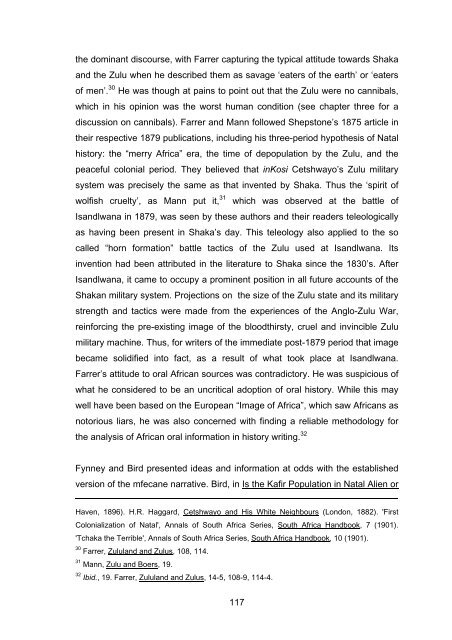The Historiographical Development of the Concept “mfecane” and ...
The Historiographical Development of the Concept “mfecane” and ...
The Historiographical Development of the Concept “mfecane” and ...
Create successful ePaper yourself
Turn your PDF publications into a flip-book with our unique Google optimized e-Paper software.
<strong>the</strong> dominant discourse, with Farrer capturing <strong>the</strong> typical attitude towards Shaka<br />
<strong>and</strong> <strong>the</strong> Zulu when he described <strong>the</strong>m as savage ‘eaters <strong>of</strong> <strong>the</strong> earth’ or ‘eaters<br />
<strong>of</strong> men’. 30 He was though at pains to point out that <strong>the</strong> Zulu were no cannibals,<br />
which in his opinion was <strong>the</strong> worst human condition (see chapter three for a<br />
discussion on cannibals). Farrer <strong>and</strong> Mann followed Shepstone’s 1875 article in<br />
<strong>the</strong>ir respective 1879 publications, including his three-period hypo<strong>the</strong>sis <strong>of</strong> Natal<br />
history: <strong>the</strong> “merry Africa” era, <strong>the</strong> time <strong>of</strong> depopulation by <strong>the</strong> Zulu, <strong>and</strong> <strong>the</strong><br />
peaceful colonial period. <strong>The</strong>y believed that inKosi Cetshwayo’s Zulu military<br />
system was precisely <strong>the</strong> same as that invented by Shaka. Thus <strong>the</strong> ‘spirit <strong>of</strong><br />
wolfish cruelty’, as Mann put it, 31 which was observed at <strong>the</strong> battle <strong>of</strong><br />
Is<strong>and</strong>lwana in 1879, was seen by <strong>the</strong>se authors <strong>and</strong> <strong>the</strong>ir readers teleologically<br />
as having been present in Shaka’s day. This teleology also applied to <strong>the</strong> so<br />
called “horn formation” battle tactics <strong>of</strong> <strong>the</strong> Zulu used at Is<strong>and</strong>lwana. Its<br />
invention had been attributed in <strong>the</strong> literature to Shaka since <strong>the</strong> 1830’s. After<br />
Is<strong>and</strong>lwana, it came to occupy a prominent position in all future accounts <strong>of</strong> <strong>the</strong><br />
Shakan military system. Projections on <strong>the</strong> size <strong>of</strong> <strong>the</strong> Zulu state <strong>and</strong> its military<br />
strength <strong>and</strong> tactics were made from <strong>the</strong> experiences <strong>of</strong> <strong>the</strong> Anglo-Zulu War,<br />
reinforcing <strong>the</strong> pre-existing image <strong>of</strong> <strong>the</strong> bloodthirsty, cruel <strong>and</strong> invincible Zulu<br />
military machine. Thus, for writers <strong>of</strong> <strong>the</strong> immediate post-1879 period that image<br />
became solidified into fact, as a result <strong>of</strong> what took place at Is<strong>and</strong>lwana.<br />
Farrer’s attitude to oral African sources was contradictory. He was suspicious <strong>of</strong><br />
what he considered to be an uncritical adoption <strong>of</strong> oral history. While this may<br />
well have been based on <strong>the</strong> European “Image <strong>of</strong> Africa”, which saw Africans as<br />
notorious liars, he was also concerned with finding a reliable methodology for<br />
<strong>the</strong> analysis <strong>of</strong> African oral information in history writing. 32<br />
Fynney <strong>and</strong> Bird presented ideas <strong>and</strong> information at odds with <strong>the</strong> established<br />
version <strong>of</strong> <strong>the</strong> mfecane narrative. Bird, in Is <strong>the</strong> Kafir Population in Natal Alien or<br />
Haven, 1896). H.R. Haggard, Cetshwayo <strong>and</strong> His White Neighbours (London, 1882). 'First<br />
Colonialization <strong>of</strong> Natal', Annals <strong>of</strong> South Africa Series, South Africa H<strong>and</strong>book, 7 (1901).<br />
'Tchaka <strong>the</strong> Terrible', Annals <strong>of</strong> South Africa Series, South Africa H<strong>and</strong>book, 10 (1901).<br />
30 Farrer, Zulul<strong>and</strong> <strong>and</strong> Zulus, 108, 114.<br />
31 Mann, Zulu <strong>and</strong> Boers, 19.<br />
32 Ibid., 19. Farrer, Zulul<strong>and</strong> <strong>and</strong> Zulus, 14-5, 108-9, 114-4.<br />
117

















